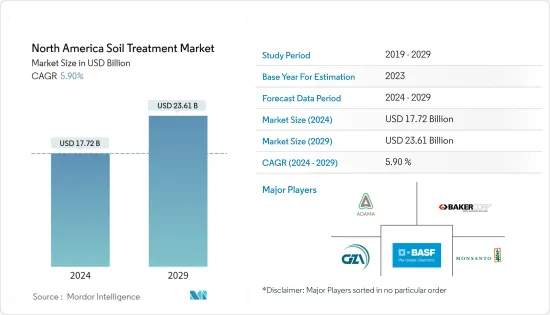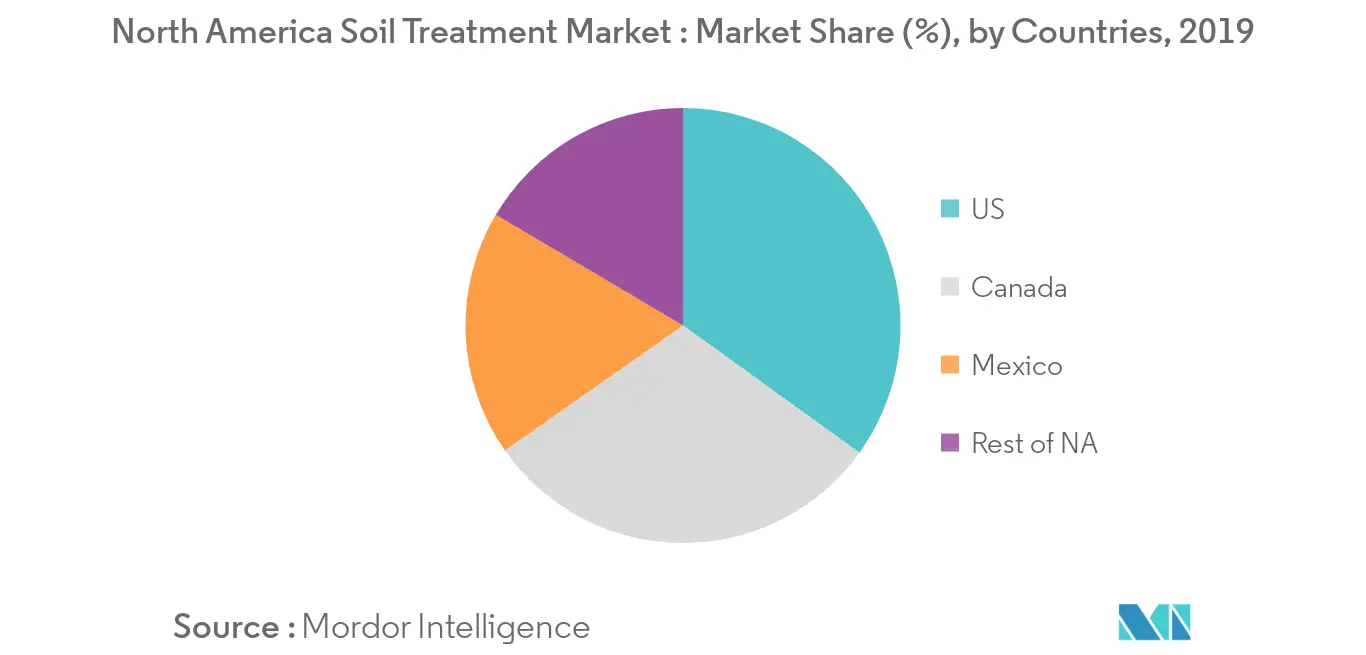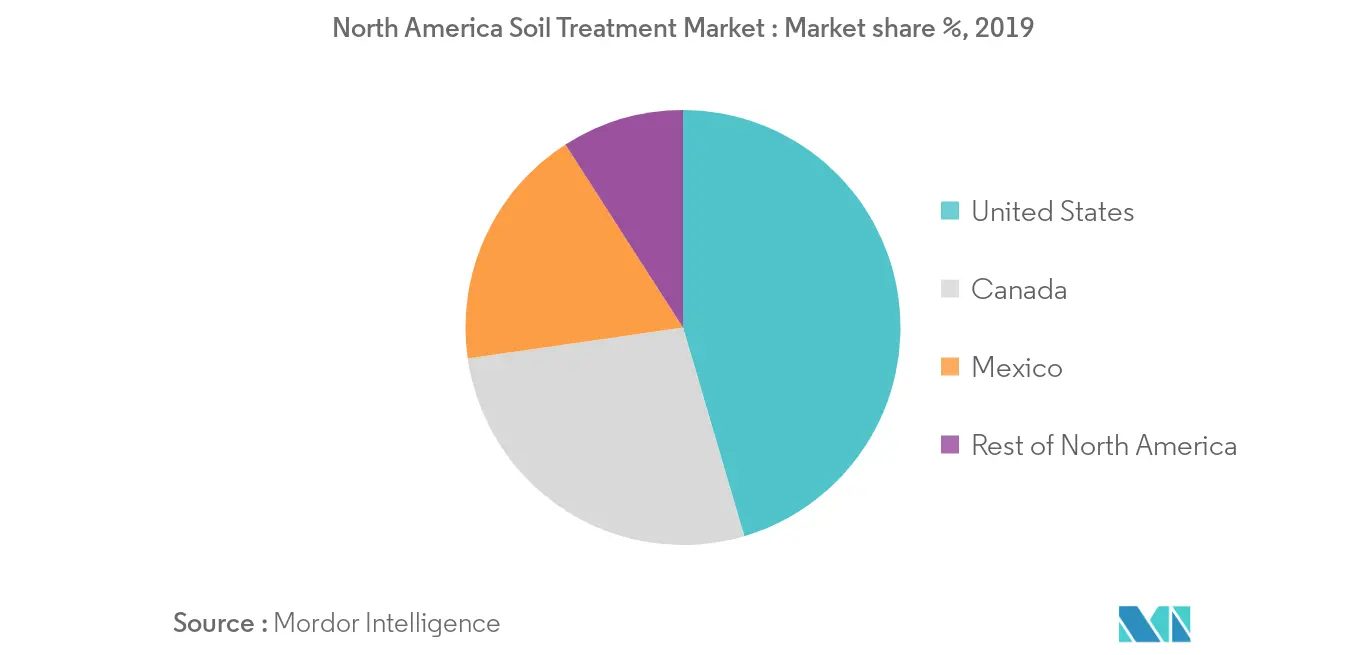PUBLISHER: Mordor Intelligence | PRODUCT CODE: 1429474

PUBLISHER: Mordor Intelligence | PRODUCT CODE: 1429474
North America Soil Treatment - Market Share Analysis, Industry Trends & Statistics, Growth Forecasts (2024 - 2029)
The North America Soil Treatment Market size is estimated at USD 17.72 billion in 2024, and is expected to reach USD 23.61 billion by 2029, growing at a CAGR of 5.90% during the forecast period (2024-2029).

In modern-day agriculture, soil treatment mainly denotes nutritional management that improves the fertility of the soil and amount of organic matter content that improves the soil structure and function.
Soil treatment acts as a versatile solution for many field problems, as it impacts the soil structure, nutritional profile, and biodiversity.
The demand for high-quality food, growing preference for organically cultivated products, high industrialization, agriculturally advanced nations like the United States, and the shrinking farmland issue is necessitating the need for soil treatment product applications. While the market is showing high potential for growth, stringent regulatory structures in the region are going to impact the market.
High product innovation and investments in research and developments may pave the way for the future growth.
North America Soil Treatment Market Trends
High Amount of Soil Contamination
The market for soil treatment is dominated by developed regions like the United States, Canada, and Mexico. More than one-fourth of the global market share is covered by the North American region alone. Most of the soil treatment market demand in the region is from the United States, given its highly evolved and advanced agricultural industry. The United States is a country considered to have a major amount of contaminated soil, as the biggest risks for soil contamination are in urban areas and former industrial sites. According to the Soil Science Society of America, creosote, a complex mixture of chemicals used to preserve wood in the United States, can leach out of treated wood and contaminate the soil and even cause blisters on the skin when touched. The high amount of soil contamination is the reason behind the growth of the soil treatment market in the country.
Additionally, former farmlands in the United States have residue build-up of contaminants, including many pesticides composed of lead-arsenate. This accompanied by the extensive development and use of herbicides, and a high load of fertilizer applications is contaminating the American soil. Hence, there is a huge demand for soil treatment products in the country.

United Sates Dominates the Market
The United States is a country considered to have a major amount of contaminated soil, as the biggest risks for soil contamination are in urban areas and former industrial sites. According to the Soil Science Society of America, creosote, a complex mixture of chemicals used to preserve wood in the United States, can leach out of treated wood and contaminate the soil and can even cause blisters on the skin when touched. The high amount of soil contamination is the reason behind the growth of the soil treatment market in the country. Additionally, former farmlands in the United States have residues of the build-up of contaminants including many pesticides composed of lead-arsenate. This accompanied by the extensive development and use of herbicides and a high load of fertilizer applications are contaminating the American soils, thereby, creating a huge demand for soil treatment products in the country. The United States Department of Agriculture (USDA) has laid down directives specifying the phytosanitary requirements for the import and domestic movement of soil and soil-related matter. It includes requirements for soil and items contaminated with soil, such as logs or lumber, vehicles, equipment, tools, and containers. This makes it necessary for contaminated soils to be treated, further enhancing the market in the country. GZA GeoEnvironmental Inc., CBA Environmental Services Inc., and Compass Remediation Chemicals are involved in the remediation of soil in the United States.

North America Soil Treatment Industry Overview
In the soil treatment market, companies not only compete on product quality or product promotion but also focus on strategic moves to acquire a greater market share. The major players are Adama Agricultural Solutions Ltd, Baker Corp., BASF SE, Syngenta, Certis USA LLC, and Arysta Lifescience Corporation, among others.
Additional Benefits:
- The market estimate (ME) sheet in Excel format
- 3 months of analyst support
TABLE OF CONTENTS
1 INTRODUCTION
- 1.1 Study Deliverables
- 1.2 Study Assumptions
- 1.3 Scope of the Study
2 RESEARCH METHODOLOGY
3 EXECUTIVE SUMMARY
4 MARKET DYNAMICS
- 4.1 Market Overview
- 4.2 Market Drivers
- 4.3 Market Restraints
- 4.4 Porter's Five Forces Analysis
- 4.4.1 Threat of New Entrants
- 4.4.2 Bargaining Power of Buyers/Consumers
- 4.4.3 Bargaining Power of Suppliers
- 4.4.4 Threat of Substitute Products
- 4.4.5 Intensity of Competitive Rivalry
5 MARKET SEGMENTATION
- 5.1 Technology
- 5.1.1 Physiochemical Treatment
- 5.1.2 Thermal Treatment
- 5.1.3 Biological Treatment
- 5.2 Type
- 5.2.1 Organic Amendments
- 5.2.2 pH Adjusters
- 5.2.3 Soil Protection
- 5.3 Geography
- 5.3.1 North America
- 5.3.1.1 United States
- 5.3.1.2 Canada
- 5.3.1.3 Mexico
- 5.3.1.4 Rest of North America
- 5.3.1 North America
6 COMPETITIVE LANDSCAPE
- 6.1 Most Adopted Competitor Strategies
- 6.2 Market Share Analysis
- 6.3 Company Profiles
- 6.3.1 Novozymes A/S
- 6.3.2 Camson Bio Technologies Ltd
- 6.3.3 E.I. Dupont De Nemours & Company
- 6.3.4 Makhteshim Agan Group
- 6.3.5 Monsanto Company
- 6.3.6 Syngenta
- 6.3.7 The Dow Chemical Company
- 6.3.8 Agraquest Inc.
- 6.3.9 Amvac Chemical Corporation
- 6.3.10 BASF Se
- 6.3.11 Certis USA Llc
7 MARKET OPPORTUNITIES AND FUTURE TRENDS




